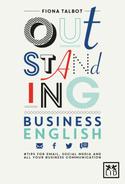
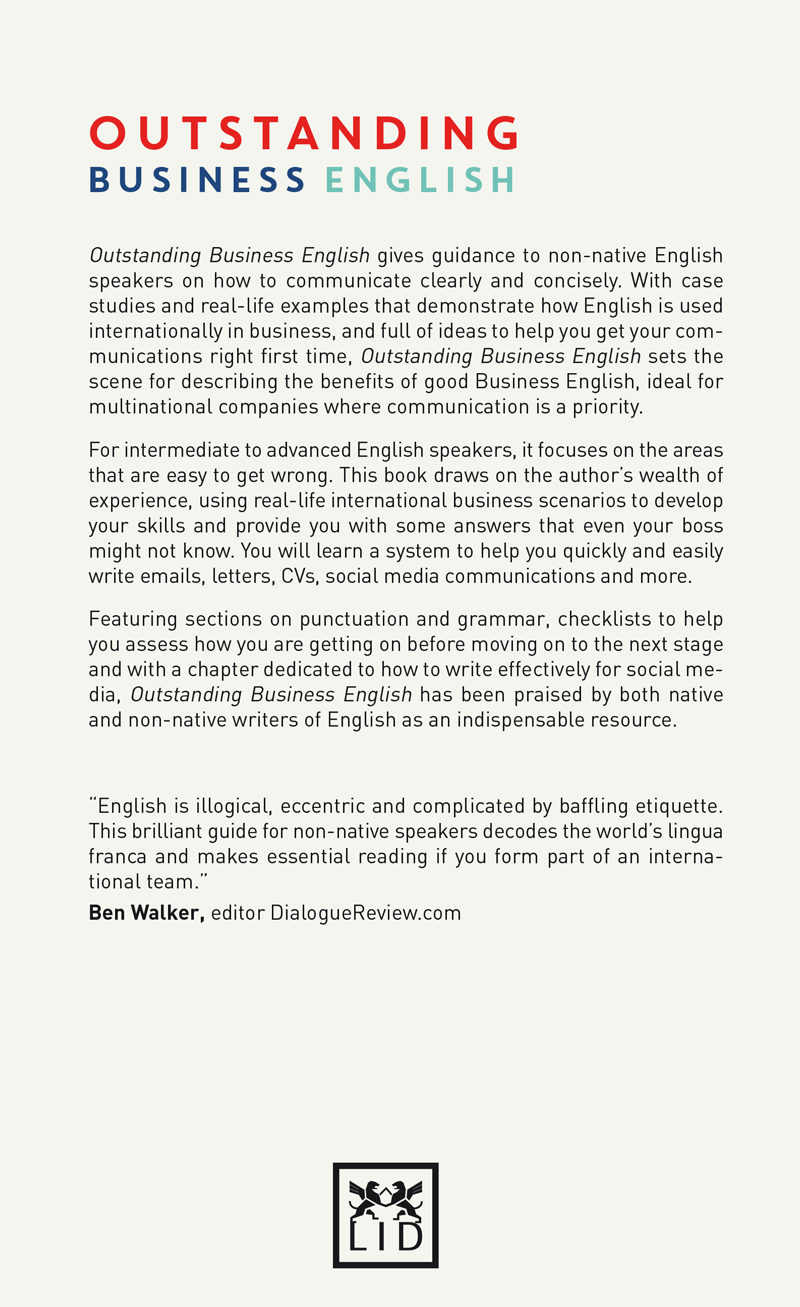
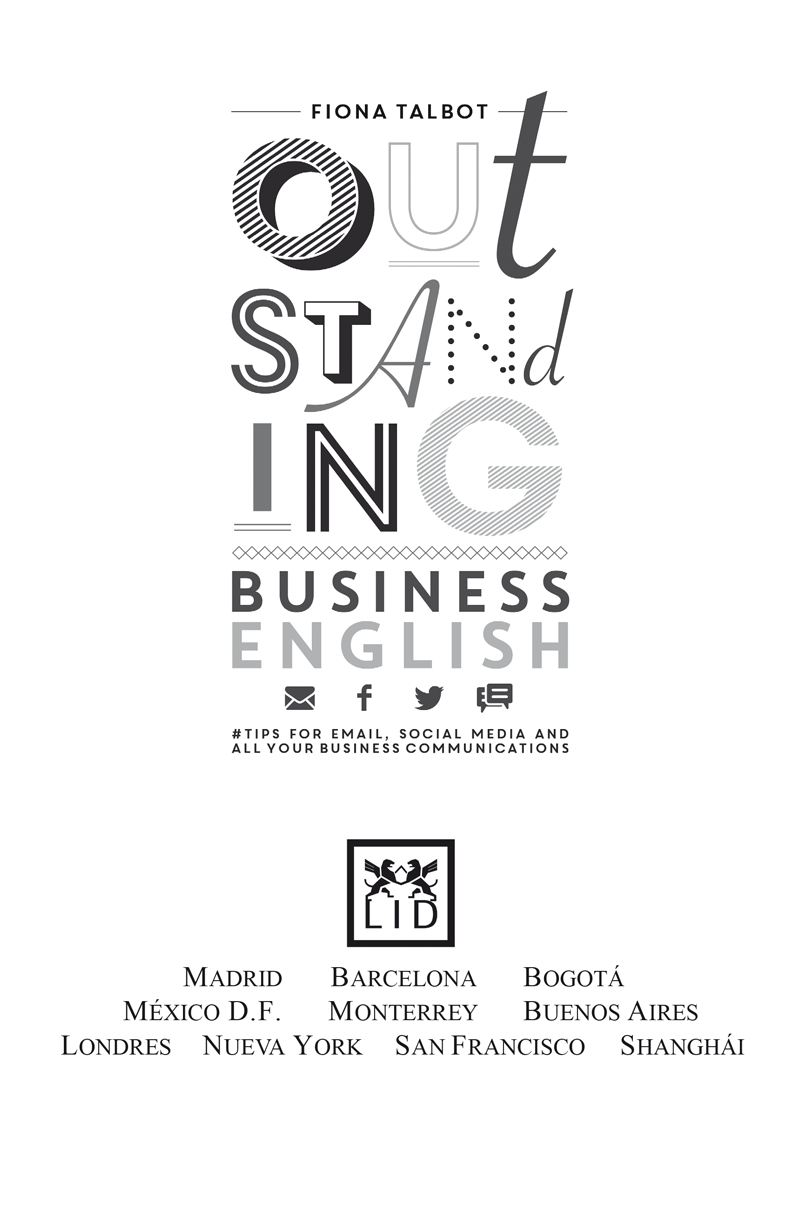
Contents
Preface
Dont just be enthusiastic in #socialmedia. Its passion, not management speak, that engages readers throughout all your corporate communications.
Fiona Talbot
Who is this book for?
If you are in business (or are preparing to enter the workplace) and you grasp the inescapable fact that the written word takes centre stage in business communication today, then this is the ideal business English primer for you. Its extensive task-based guidance provides a toolkit for developing the highly prized workplace skills that bosses need.
Increasingly, English is the language of choice in the information age, widely used on the web and in multinational gatherings. It may not be the predominant language of the group, but is the most likely to be understood by the majority at least at a basic level so becomes a powerful tool for communication and inclusion. In the age of social media, the English language has commercial global currency. It can give the power to reach out not just to English-speaking home markets but internationally too.
So this book is aimed equally at native and non-native English speakers (who are proficient to intermediate level and above). Whichever you are, you will uncover valuable tips on how to get your business English writing right on every level.
Be effective by writing content of value
Effective writing is no longer just about traditional reports, presentations, letters and so on. Today, writing skills matter more than ever: in e-mail, instant messaging, infographics and social media even in the fast-growing medium of video storytelling where meaningful captions and calls to action are key.
Todays need is for content of value. And content means every word you use in every business writing task you do. Everything should add up to make great corporate communication.
Bosses need people who can write well, grab attention for the right reasons, influence, persuade, reflect brand and values and enhance reputation... all in the shortest time.
And if you are a start-up operating from home, you too can have the same potential global reach as the large corporate. The rules of engagement involve writing to impress, sell messages, values, products or services, and create a following and brand reputation based on trust. These principles are the same for all.
How does the book work?
The book will work for anyone who is a native English speaker or proficient in English to intermediate level and above.
It teaches my four-step Word Power Skills writing system which is now used worldwide. Its about:
- identifying the right messages at planning stage, communicating these clearly and interestingly so that people understand you and want to read on;
- being professional and getting the results you and your readers need.
The book describes scenarios every office encounters and gives practical advice on how to write successfully. The real-life examples make great discussion points with bosses and colleagues and you will be able to customize the tips for your every writing task.
The beauty of the system is that it works across traditional and emerging new channels.
You may have to unlearn some things you learnt at school
Writing English for business today is unlikely to be the same as the writing you were taught at school or university. Apart from getting your punctuation and grammar right, the similarities often end there. With countries the world over facing a shortage of people with key communication skills, employers cry out for people who can impress, sell messages, values and brand, consistently and professionally.
Get results!
Just take a look at my methods, focus on the elements that apply to your business writing and make sure they become an intrinsic part of your real-life performance.
Enjoy using word power as a free resource indeed my clients find they buzz with it! Enjoy too the benefits of immediate results and sustainable improvements.
Good luck on your journey to success!
Fiona Talbot
TQI Word Power Skills
Introduction
T his book is an essential guide to keep with you, by your desk or on your travels. It provides a wealth of answers to help you impress and shine through effective business English writing for the modern workplace.
Look on it as your introduction to being the best! By the time you reach the end, you will be more confident and more competent in writing English.
As well as dealing with traditional writing, this book shows how writing for social media has turned the world of business writing inside out. It actually needs a whole new mind-set and an integrated approach to work.
This new kid on the block relies on the written word and is vying for centre stage. Its also making us reassess all corporate communication in its light. Responsive businesses will grasp the need to welcome its ascendancy; the complacent will fail to give it the attention it deserves. The only constant now is communicating professionally and credibly at all times and the writing system you are shown throughout the book works across all tasks and every medium.
You will be developing a key transferable skill that employers welcome and that can open doors for your career, since English is the global business language of today.
Chapter One
Why are you writing?
Who are your readers?
Throughout this book I use the terms readers, target readership, customers and audience interchangeably. A customer can be a person who buys goods or services from a business, or can be a person you deal with in the course of your daily work. The term applies just as much to internal colleagues, suppliers, those in the public sector etc as it does to those who are external consumers.
Your audience can be anyone and everyone
Where you know your target audiences profile, you have an immediate advantage. The digital age is all about customizing products and services to suit the individual customer. It works for communication too. By what means does your target readership like to receive messages? Are you able to match their needs and cultural expectations and engage their interest because you know their profile? Its great news if you can.
But theres something new happening as well. The potential global reach of your e-writing (which includes social media) is really exciting. The business that operates from home can have as loud a voice as the large corporate. Your messages may (perhaps unexpectedly) be forwarded on by others, even go viral. So every business message, personalized or not, had better be professional! Nothing should be open to misinterpretation or cause offence, even unintentionally.
Many practical examples and scenarios in this book relate to sales or customer pitches. Because were all consumers in our private lives, we can relate to and understand these examples. What I would like to stress is that the concepts apply equally to every scenario in the list that follows. Think of lobbying; think of politics; think of charities; think of fundraising; think of promotions.
Whats the purpose of your writing?
People sometimes think of business writing as a soft skill as opposed to the hard skills of finance, law, IT etc. But I think this description is misleading. The label soft can give the impression that business writing is an easy skill, which it certainly is not. Business writing can impact on the whole business cycle; it can win business, it can lose business and it can communicate the framework by which results can be achieved.

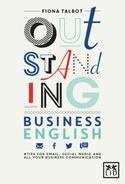
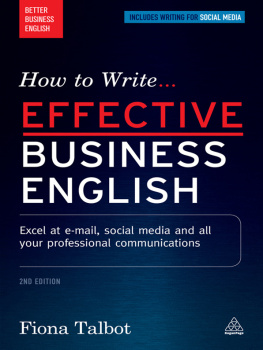

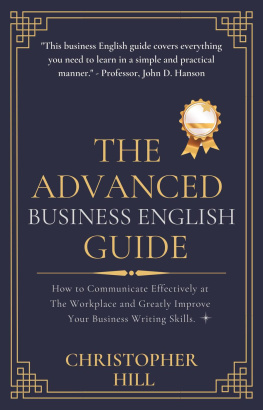


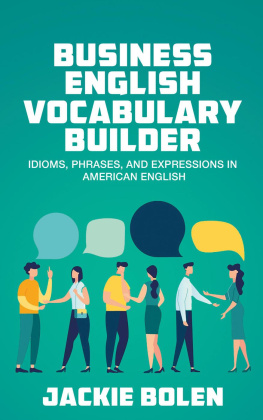


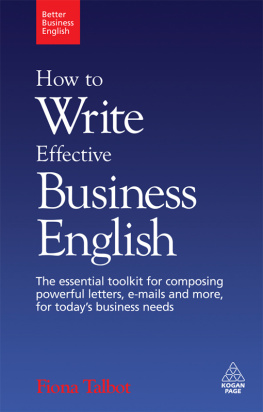
![Bhattacharjee Sudakshina - Improve your global business english: [the essential toolkit for writing and communicating across borders]](/uploads/posts/book/205847/thumbs/bhattacharjee-sudakshina-improve-your-global.jpg)


